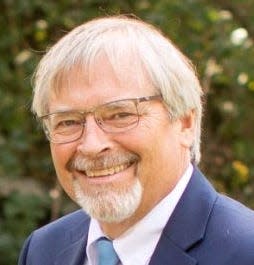Attorney General Mark Vargo moves to address human trafficking: Brad Johnson

Among the casualties of former Attorney General Jason Ravnsborg’s impeachment proceedings were the hiring of people to combat human trafficking and solve missing and murdered person cases.
“When I arrived on June 28, there were two folders sitting on my desk. One was the applicants for the human trafficking coordinator position. And one was the applicants for the missing and murdered Indigenous persons liaison,” Attorney General Mark Vargo told a group of rotarians gathered in Rapid City late last month.
The 2021 South Dakota Legislature authorized the positions, and Gov. Kristi Noem signed the bill March 29, 2021. No guidance was provided on the employees’ duties.
“And the previous attorney general apparently didn't really have much of an idea because they sat for a little over a year unfilled,” Vargo said.
More: South Dakota's invasive species effort needs more urgency: Brad Johnson
He said the human trafficking position will have more of a statewide emphasis whereas the missing and murdered Indigenous persons job will be more focused on Native American country.
Vargo was meeting with rotarians because the Rapid City clubs are collaborating with the Los Angeles rotary district and a rotary district in Japan to create an internationally supported project focused on human trafficking on Indian reservations.
Makiko Nakasone, the governor of a Los Angeles district that covers about 1.7 million people, is interested in South Dakota because she was an exchange student at Milbank High School in 1975-76. Koseki Nakamura, an incoming district governor in Japan, attended representing the international partnership.
Vargo spent about three hours with the rotarian group explaining the complexity of the issues. Vargo was the long-time Pennington County states attorney before Noem appointed him to finish Ravnsborg’s term after he was impeached.
Marty Jackley will take over as the next attorney general after November’s election, when Vargo will return to his state’s attorney job.
Vargo is determined to get those positions established, expecting to hire people in October.
More: Big Sioux River watershed project dead, new effort won't protect local lakes: Brad Johnson
“We've already started the process of meeting with our human trafficking partners to determine where it is that they feel that there are gaps that we could fill. And we intend to do the same thing with the (missing and murdered Indigenous persons) coordinator.”
Vargo said he welcomed any help rotarians, or any other non-governmental agency, can provide in combatting these issues.
He noted that there is much mistrust “between the Native nation and the state of South Dakota, and it can only be overcome on an individual level. You can't just wave a magic wand and say, ‘OK, it's been long enough, fine. We're just going to move past that.’
“And so that individual connectivity is something that I think is embodied by your suggestion, and it's something that I am very much committed to in my tenure as attorney general. However short it may be," Vargo said.
Statistics indicate that nearly 70% of missing people are Native Americans, even though they make up only about 9 % of the state’s population.
Likewise, Native American youth are particularly vulnerable to human trafficking.
“About two-thirds of our victims out in Indian Country are familial-related, meaning that your father or your mother or your uncle or somebody places you into trafficking," Vargo said.
Often, children are traded for drugs or alcohol, he said. In other cases, children are forced into trafficking because of a lack of shelter or food.
Solving human trafficking crimes is difficult, so prevention is particularly important, he said.
“It is so hard to prosecute human trafficking cases because of the inherent weaknesses of survivors," Vargo said. "They aren't necessarily ready to go into a courtroom to stand on their own.
“The sad statistic is that even with everything that we can do through our survivor organizations, only between 1 and 3% of our victims reach the status to become survivors," he said. "Most of them go back into that lifestyle perhaps with a different trafficker.”
More: Immigration reform may be gaining steam with SD congressional delegation: Brad Johnson
Many partnerships are needed, he said.
“I really feel like where we have an absence is on the protection side.
“Every person that is trafficked is because they're vulnerable in some way. So, wrapping the vulnerable in protections before they ever enter this life is absolutely essential to addressing the problem," Vargo said.
Brad Johnson is a Watertown businessman and journalist who is active in state and local affairs.
This article originally appeared on Watertown Public Opinion: Attorney general moves to address human trafficking
